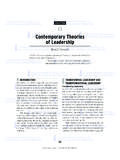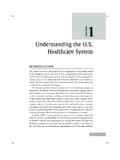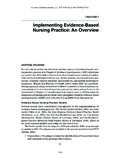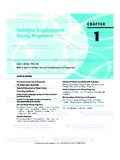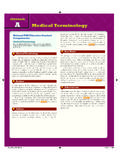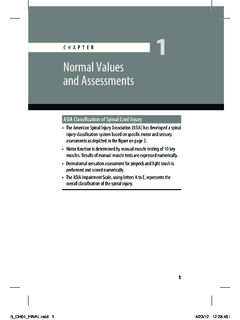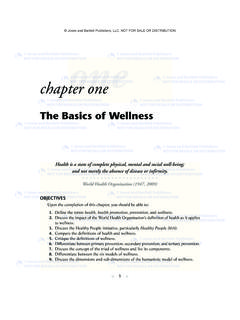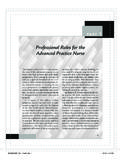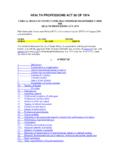Transcription of HEALTH CARE PROFESSIONALS LEGAL–ETHICAL ISSUES
1 LEARNING OBJECTIVESUpon completion of this chapter, the reader will be able to: Identify a variety of ethical and legal ISSUES that arise in selected HEALTH care professions ( , nursing, emergency services, laboratory, pharmacy, radiology). Explain how practicing one s professional code of ethics can assist in resolving day-to-day ISSUES that arise during patient care . Explain the difference between the certification and licensure of a HEALTH care professional . Identify helpful suggestions that help caregivers provide high-quality care PROFESSIONALS legal ethical ISSUESE thics is nothing else than reverence for life.
2 ALBERT SCHWEITZER Fuse/Thinkstock 299 29908/11/14 11:43 AMINTRODUCTIONMy life is my message. MAHATMA GANDHIThis chapter presents an overview of how ethics and the law affect a variety of HEALTH care professions. The ethical codes for each profession demand a high level of integrity, honesty, and responsibility. Codes of ethics are designed to facilitate the resolution of common ethical dilemmas that arise in one s contents of codes of ethics vary depending on the risks associated with a particular pro-fession.
3 ethical codes for psychologists, for example, define relationships with clients in greater depth because of the personal one-to-one relationship they have with their clients. Laboratory technicians and technologists, on the other hand, generally have little or no personal contact with patients but can have a significant impact on their care . Laboratory technologists in their ethical code pledge accuracy and reliability in the performance of tests. The importance of this pledge was borne out in a March 11, 2004, report by the Baltimore Sun wherein state HEALTH officials discovered that a hospital s laboratory personnel overrode controls in testing equipment showing results that might be in error and then mailed them to patients The various codes of ethics for each HEALTH care profession are accessible by profession on the ETHICS AND legal ISSUESTo Be a Nurse.
4 Swedish Hospital, Seattle, Washington In memory of all those patients that have enriched my life and blessed me with their spirit of living while they are dying. Nursing is the honor and privilege of caring for the needs of individuals in their time of need. The responsibility is one of growth to develop the mind, soul, and physical well-being of one-self as well as the one cared for. Excellence is about who we are, what we believe in, what we do with everyday of our lives. And in some ways we are a sum total of those who have loved us and those who we have given ourselves to.
5 I have been with a number of people/patients when they die and have stood in awe. Nursing encompasses the sublime and the dreaded. We are regularly expected to do the impossible. I feel honored to be in this profession. To get well I knew I had to accept the care and love that were given to me when I did heal-ing washed over me like water. Through all of this I was never alone. In the caring for one another both are forever changed. A friend takes your hand and touches your heart. To all of you whose names were blurred by the pain and the drugs.
6 Don t ever underestimate your role in getting patients back on their feet. Will I lose my dignity? Will someone care ? Will I wake tomorrow from this nightmare? You exist as women living between heaven and hell. Inside a machine that demands absolute vigilance. I hated every minute of my stay with you; however, I totally realize the value of your efforts. Please accept my heartiest thank you. UNKNOWN AUTHORS300 CHAPTER 9 HEALTH care PROFESSIONALS legal ethical 30008/11/14 11:43 AMThe nurse is generally the one medical professional the patient sees more than any other.
7 Con-sequently, the nurse is in a position to monitor the patient s illness, response to medication, display of pain and discomfort, and general condition. This section provides an overview of the ethical responsibilities and legal ISSUES of nursing practice. Although nurses traditionally have followed the instructions of attending physicians, physicians realistically have long relied on nurses to exercise independent judgment in many Patients in hospitals, nursing homes, or at home learning to manage a chronic condition are often at their most vulnerable moments.
8 Nurses are the HEALTH care providers they are most likely to encounter; spend the greatest amount of time with; and often depend on for care . Research is now beginning to document what physicians, patients, other HEALTH care providers, and nurses themselves have long known: how well we are cared for by nurses affects our HEALTH and sometimes can be a matter of life or more than a decade old nursing shortage continues to require hospitals to search for foreign-trained registered nurses. New immigration laws have complicated the hiring and immigration process.
9 Many countries are facing similar shortages, thus raising ethical dilem-mas when recruiting foreign nurses from countries with shortages of their salaries and incentives have done little to resolve the nursing shortage. The unem-ployment rate would be expected to provide some incentive for students to enter the nursing profession, but the shortage persists. The Secretary of HEALTH and Human Services (HHS), Kathleen Sebelius, announced that $ million in funding was awarded in FY 2013 to strengthen training for HEALTH PROFESSIONALS and increase the size of the nation s HEALTH care grants and the many training programs they support have a real impact by help-ing to create innovative care delivery models and improving access to high-quality care , Secretary Sebelius than 270 grants will address HEALTH workforce needs in nursing, public HEALTH , behavioral HEALTH .
10 HEALTH workforce development, and dentistry. The grants are managed by HHS HEALTH Resources and Services Administration (HRSA).A majority of the funding, $ million, will support nursing workforce devel-opment in the following areas: Increasing the number of nurse faculty ($ million) provides low-interest loans to nurses to train to become faculty and loan cancellation for service as faculty. Improving nursing diversity ($ million) expands educational opportunities for students from disadvantaged backgrounds, including racial and ethnic minori-ties who are underrepresented among registered nurses.
